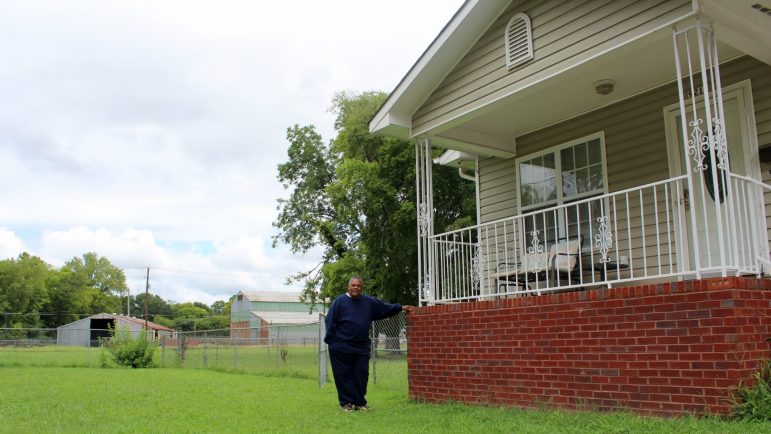There are thousands of tax delinquent properties in Jefferson County. Many of them are vacant and in disrepair. But even burned down houses and empty lots can still rack up thousands of dollars in unpaid taxes and fees. This is the second part of our look at Alabama’s tax lien system.
The Cycle of Blight
For Richard Harris, cutting the grass is an all-day affair. “It’ll take me a good morning out here, an afternoon, four or five hours to cut all the property out here,” says Harris. In addition to his own lawn, Harris is taking care of the six vacant lots next door. He is participating in the Side Lot Program through Birmingham’s Land Bank Authority. The program allows residents to acquire neighboring tax delinquent lots at a low cost.
Harris lives in South Pratt, a community littered with abandoned properties. He says for years he has wanted to do something about the land next to his house. “The properties that I acquired did not have structures on them,” Harris explains. “They were overgrown and had a lot of trash on them. But the owners are no longer around, no longer have any interest in maintaining the property so it just sits there and goes bad,” he says. Making matters worse, these empty lots were accumulating a combined total of more than $35,000 in unpaid property taxes. It is an ironic outcome for Birmingham’s most blighted, most chronically tax delinquent properties. And it goes back to Alabama’s tax lien system.
Cost of Delinquency
When an owner does not pay property taxes, the local government puts a lien on the property for the value of that unpaid tax. The problem with a lien is that it puts a hold on the property, so it has to be paid off in order to buy or sell that property. The thing is, for most abandoned homes, the original owners never pay back these debts, so there is no incentive for anyone to invest in them. These properties are placed under the control of the state and maintained on a list called the Transcript of Delinquent Land for Sale in Jefferson County. At any given time, this list can include more than 20,000 properties.
Frank Alexander is co-founder and senior advisor to the Center for Community Progress, a nonprofit focused on ending blight. According to Alexander, this list of properties is key to the issue of abandonment, explaining, “The large inventory of properties held at the state level in Alabama tells me that the system simply is not putting the property into new ownership.” Alexander says the problem with our system is that the longer a delinquent parcel is held by the state, the more expensive it becomes to do anything with it. Property tax liens accrue interest at a rate of 12% a year. On top of this, more liens can be added for things like weed abatement or demolition. All these fees have to be paid off to redeem a property or buy it from the state. For a vacant house or abandoned lot, the cost can quickly amount to more than the property is worth. No one buys them and the properties keep collecting new liens, which keep earning interest year after year.
Owning the Problem
Alexander says the current approach to tax delinquency ultimately ravages local neighborhoods, yet, city leaders are limited in what they can do to address the issue. That’s because tax delinquent properties remain under the control of the state. “Right now the vacant and abandoned property that no one wants and no one will touch, is the problem of the local government, but they don’t own the property,” Alexander explains. “They own the problem, but not the property.”
This is where the Land Bank comes in. Birmingham’s Land Bank Authority can acquire tax delinquent properties from the state for free and transfer them to new owners. This means no liens, no outstanding debts to be paid. A property has to be delinquent for at least 5 years to be eligible. For local governments, it finally provides an avenue to deal with some of these abandoned properties; but the Land Bank does not change the overall system. Tax delinquent properties are still controlled by the state, where they can sit for years stockpiling liens and fees. It is not a catch-all; it is more of a work-around. But Director of the Department of Community Development John Colón says the idea is to get at least some of these vacant homes and overgrown lots into the hands of people who will actually take care of them and start paying the taxes again. Colón says this starts with local residents. “The bulk of the interest we’re seeing is from the neighbors, from the citizens,” says Colón. “They’re the ones that really have an interest in stabilizing their community, improving their property values, expanding their property lines.”
No Easy Fix
For residents, the Land Bank can take away the costs of outstanding liens; but in South Pratt, Richard Harris says acquiring abandoned, tax delinquent property still requires investment in time and money. Working with the Land Bank, Harris agreed to maintain the six vacant lots next door for two years. Then he can decide if he wants to fully own them. Right now he says he is not sure what he will do. There could be additional legal fees associated with owning the property and it will likely be expensive to develop the land, because most of it is in a flood zone.
Overall, Harris says he is not totally sold on the Land Bank, but he adds, at least it is a start. “I’m not the only one I guess. A lot of neighborhoods are frustrated by this issue all over the place,” says Harris. “The Land Banking [sic] Authority could be a good first step, but I think a lot more needs to be done.”

